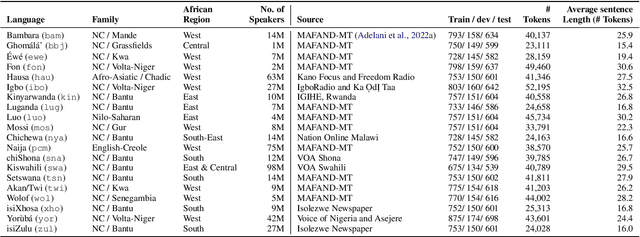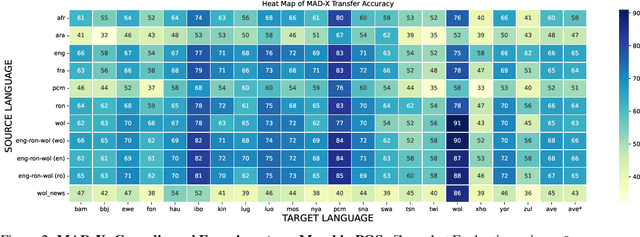Ikechukwu Onyenwe
MasakhaPOS: Part-of-Speech Tagging for Typologically Diverse African Languages
May 23, 2023



Abstract:In this paper, we present MasakhaPOS, the largest part-of-speech (POS) dataset for 20 typologically diverse African languages. We discuss the challenges in annotating POS for these languages using the UD (universal dependencies) guidelines. We conducted extensive POS baseline experiments using conditional random field and several multilingual pre-trained language models. We applied various cross-lingual transfer models trained with data available in UD. Evaluating on the MasakhaPOS dataset, we show that choosing the best transfer language(s) in both single-source and multi-source setups greatly improves the POS tagging performance of the target languages, in particular when combined with cross-lingual parameter-efficient fine-tuning methods. Crucially, transferring knowledge from a language that matches the language family and morphosyntactic properties seems more effective for POS tagging in unseen languages.
Developing Smart Web-Search Using RegEx
Oct 10, 2021
Abstract:Due to the increasing storage data on Web Applications, it becomes very difficult to use only keyword-based searches to provide comprehensive search results, thus increasing the difficulty for web users to search information on the web. In this paper, we proposed using a combined method of keyword-based and Regular expressions (regEx) searches to perform a search using strings of targeted items for optimal results even as the volume of data around the world on the Internet continues to explode. The idea is to embed regEx patterns as part of the search engine's algorithm in a web application project to provide strings related to the targeted items for more comprehensive coverage of search results. The user's search query is a string of characters guided by search boundaries selected from the entry point. The results returned from the search operation are different results within a category determined by the search boundaries. This is designed to be beneficial to a user who has an obscure idea about the information he/she wanted to search but knows the boundaries within which to get the information. This technique can be applied to data processing tasks such as information extraction and search refinement.
Developing Products Update-Alert System for e-Commerce Websites Users Using HTML Data and Web Scraping Technique
Sep 02, 2021


Abstract:Websites are regarded as domains of limitless information which anyone and everyone can access. The new trend of technology put us to change the way we are doing our business. The Internet now is fastly becoming a new place for business and the advancement in this technology gave rise to the number of e-commerce websites. This made the lifestyle of marketers/vendors, retailers and consumers (collectively regarded as users in this paper) easy, because it provides easy platforms to sale/order items through the internet. This also requires that the users will have to spend a lot of time and effort to search for the best product deals, products updates and offers on e-commerce websites. They have to filter and compare search results by themselves which takes a lot of time and there are chances of ambiguous results. In this paper, we applied web crawling and scraping methods on an e-commerce website to get HTML data for identifying products updates based on the current time. The HTML data is preprocessed to extract details of the products such as name, price, post date and time, etc. to serve as useful information for users.
* 6 pages, 3 figures, 1 table, IJNLC Journal
Igbo-English Machine Translation: An Evaluation Benchmark
Apr 01, 2020


Abstract:Although researchers and practitioners are pushing the boundaries and enhancing the capacities of NLP tools and methods, works on African languages are lagging. A lot of focus on well resourced languages such as English, Japanese, German, French, Russian, Mandarin Chinese etc. Over 97% of the world's 7000 languages, including African languages, are low resourced for NLP i.e. they have little or no data, tools, and techniques for NLP research. For instance, only 5 out of 2965, 0.19% authors of full text papers in the ACL Anthology extracted from the 5 major conferences in 2018 ACL, NAACL, EMNLP, COLING and CoNLL, are affiliated to African institutions. In this work, we discuss our effort toward building a standard machine translation benchmark dataset for Igbo, one of the 3 major Nigerian languages. Igbo is spoken by more than 50 million people globally with over 50% of the speakers are in southeastern Nigeria. Igbo is low resourced although there have been some efforts toward developing IgboNLP such as part of speech tagging and diacritic restoration
 Add to Chrome
Add to Chrome Add to Firefox
Add to Firefox Add to Edge
Add to Edge